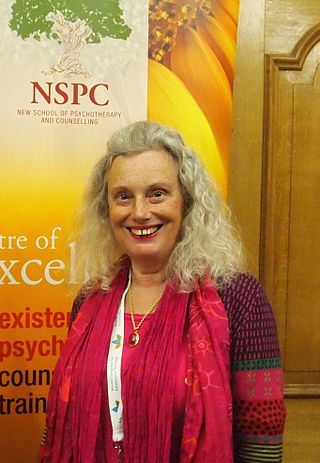Counseling psychology is a psychological specialty that began with a focus on vocational counseling, but later moved its emphasis to adjustment counseling, and then expanded to cover all normal psychology and psychotherapy. There are many subcategories for counseling psychology, such as marriage and family counseling, rehabilitation counseling, clinical mental health counseling, educational counseling, etc. In each setting, they are all required to follow the same guidelines.
Selma Fraiberg (1918–1981) was an American child psychoanalyst, author and social worker.
Couples therapy attempts to improve romantic relationships and resolve interpersonal conflicts.
The Internal Family Systems Model (IFS) is an integrative approach to individual psychotherapy developed by Richard C. Schwartz in the 1980s. It combines systems thinking with the view that the mind is made up of relatively discrete subpersonalities, each with its own unique viewpoint and qualities. IFS uses systems psychology, particularly as developed for family therapy, to understand how these collections of subpersonalities are organized.

Complex post-traumatic stress disorder is a stress-related mental disorder generally occurring in response to complex traumas, i.e., commonly prolonged or repetitive exposures to a series of traumatic events, within which individuals perceive little or no chance to escape.

Family Constellations, also known as Systemic Constellations and Systemic Family Constellations, is a pseudoscientific therapeutic method which draws on elements of family systems therapy, existential phenomenology and Zulu beliefs and attitudes to family.

Emmy van Deurzen is an existential therapist. She developed a philosophical therapy based in existential-phenomenology.
Interpersonal psychotherapy (IPT) is a brief, attachment-focused psychotherapy that centers on resolving interpersonal problems and symptomatic recovery. It is an empirically supported treatment (EST) that follows a highly structured and time-limited approach and is intended to be completed within 12–16 weeks. IPT is based on the principle that relationships and life events impact mood and that the reverse is also true. It was developed by Gerald Klerman and Myrna Weissman for major depression in the 1970s and has since been adapted for other mental disorders. IPT is an empirically validated intervention for depressive disorders, and is more effective when used in combination with psychiatric medications. Along with cognitive behavioral therapy (CBT), IPT is recommended in treatment guidelines as a psychosocial treatment of choice for depression.
Susan Johnson was a British clinical psychologist, couples therapist and author who lived and worked in Canada. She is known for her work in the field of psychology on human bonding, attachment theory and romantic relationships.
Emotionally focused therapy and emotion-focused therapy (EFT) are related humanistic approaches to psychotherapy that aim to resolve emotional and relationship issues with individuals, couples, and families. These therapies combine experiential therapy techniques, including person-centered and Gestalt therapies, with systemic therapy and attachment theory. The central premise is that emotions influence cognition, motivate behavior, and are strongly linked to needs. The goals of treatment include transforming maladaptive behaviors, such as emotional avoidance, and developing awareness, acceptance, expression, and regulation of emotion and understanding of relationships. EFT is usually a short-term treatment.
Ivan Boszormenyi-Nagy was a Hungarian-American psychiatrist and one of the founders of the field of family therapy. Born Iván Nagy, his family name was changed to Böszörményi-Nagy during his childhood. He emigrated from Hungary to the United States in 1950, and he simplified his name to Ivan Boszormenyi-Nagy at the time of his naturalization as a US citizen.
Relational-cultural theory, and by extension, relational-cultural therapy (RCT) stems from the work of Jean Baker Miller, M.D. Often, relational-cultural theory is aligned with the feminist and or multicultural movements in psychology. In fact, RCT embraces many social justice aspects from these movements.

Daniel S. Schechter is an American and Swiss psychiatrist known for his clinical work and research on intergenerational transmission or "communication" of violent trauma and related psychopathology involving parents and very young children. His published work in this area following the terrorist attacks on the World Trade Center in New York of September 11, 2001 led to a co-edited book entitled "September 11: Trauma and Human Bonds" (2003) and additional original articles with clinical psychologist Susan Coates that were translated into multiple languages and remain among the first accounts of 9/11 related loss and trauma described by mental health professionals who also experienced the attacks and their aftermath Schechter observed that separation anxiety among infants and young children who had either lost or feared loss of their caregivers triggered posttraumatic stress symptoms in the surviving caregivers. These observations validated his prior work on the adverse impact of family violence on the early parent-child relationship, formative social-emotional development and related attachment disturbances involving mutual dysregulation of emotion and arousal. This body of work on trauma and attachment has been cited by prominent authors in the attachment theory, psychological trauma, developmental psychobiology and neuroscience literatures
Gerald R. Weeks is an American author and lecturer. He has published 30 books on psychotherapy, which have been translated into multiple languages. He has published in the fields of individual, and family therapy, although he is best known for his work in sex and couple's therapy. Weeks is the founder of the Systems Approach to Sex Therapy as well as the founder of the Intersystem Approach to therapy which has been called one of the most ambitious efforts to develop an integrative approach to psychotherapy. He was a professor in the Marriage and Family Therapy Program at the University of Nevada-Las Vegas from 1999-2017. In 2017, he became Professor Emeritus as he retired from UNLV.
Family therapy is a branch of psychotherapy focused on families and couples in intimate relationships to nurture change and development. It tends to view change in terms of the systems of interaction between family members.
Transgenerational trauma is the psychological and physiological effects that the trauma experienced by people has on subsequent generations in that group. The primary mode of transmission is the shared family environment of the infant causing psychological, behavioral and social changes in the individual.

Julie Schwartz Gottman is an American clinical psychologist, researcher, speaker and author. Together with her husband and collaborator, John Gottman, she is the co-founder of The Gottman Institute – an organization dedicated to strengthening relationships through research-based products and programs. She is the co-creator of the Sound Relationship House Theory, Gottman Method Couples Therapy, and The Art and Science of Love weekend workshop for couples, among other programs.
The dynamic-maturational model of attachment and adaptation (DMM) is a biopsychosocial model describing the effect attachment relationships can have on human development and functioning. It is especially focused on the effects of relationships between children and parents and between reproductive couples. It developed initially from attachment theory as developed by John Bowlby and Mary Ainsworth, and incorporated many other theories into a comprehensive model of adaptation to life's many dangers. The DMM was initially created by developmental psychologist Patricia McKinsey Crittenden and her colleagues including David DiLalla, Angelika Claussen, Andrea Landini, Steve Farnfield, and Susan Spieker.

Lillian Comas-Díaz is an American psychologist and researcher of multiethnic and multicultural communities. She was the 2019 winner of American Psychological Association (APA) Gold Medal Award for Life Achievement in the Practice of Psychology. In 2000, she received the APA Award for Distinguished Senior Career Contribution to the Public Interest.






